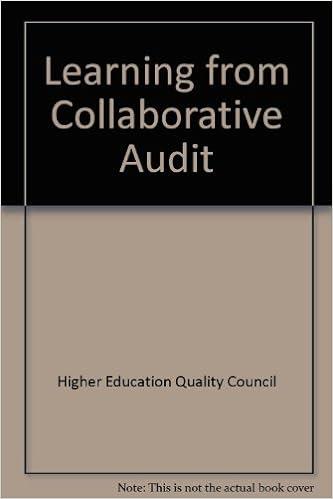Question
Please answer the following discussion: Regarding the Tata case, the first issue is that the firm did not support the partner who wrote the report.
Please answer the following discussion:
Regarding the Tata case, the first issue is that the firm did not support the partner who wrote the report. Do you think this is an isolated incident or one that could happen with ongoing frequency? Also, what about the balance of power between the firm and the client? Do you think the public accounting firm may lack independence because of economic dependence on the client? How important do you think the competitive environment was in influencing the players in this case?
In India, the business press labeled an accounting and financial reporting scandal involving Tata Finance Limited as that country's "Enron." (In fact, there were allegations that the accounting firm hired to investigate the scandal, A.F. Ferguson, had "shredded" some relevant documents.) Tata Finance is one of many public and private companies that make up the massive business conglomerate known as the Tata Group.
The scandal involved Tata Finance and a subsidiary of Tata Finance, Niskalp, that had incurred losses associated with technology stocks. The scandal was that Tata and its subsidiary had engaged in fraudulent transactions to "cover-up" these losses.
In 2001, Tata Group's senior management retained one of India's most respected accounting firms, A.F. Ferguson & Co. (AFF), to investigate the Tata Finance fraud (although AFF was not Tata Finance's audit firm did audit several of the largest Tata companies). That fraud had greatly embarrassed the Tata Group, including its chief executive, Ratan Tata. Throughout its history, the Tata organization had been known for its uncompromising ethics and commitment to public service. In fact, J.N. Tata had insisted that two-thirds of the organization's profits be contributed to charitable causes, a policy that the Tata Group follows to this day.
Ratan Tata and the other senior executives of the Tata Group believed that the person responsible for the Tata Finance fraud was that company's former "managing director" or chief operating officer, Dilip Pendse, who had been associated with the Tata Group for 25 years. However, Dilip insisted that he had kept Tata Group executives, including Ratan Tata, fully informed of Tata Finance's financial affairs. Ratan Tata and his colleagues hoped that the AFF investigation would not only establish that the former managing director was responsible for the fraud but that the investigation would also "clear their names."
The Tata Group executives were shocked when the 904-page AFF report on the Tata Finance scandal linked them to the fraud. Eventually, AFF withdrew the report and fired the three individuals responsible for writing it, including one of its senior partners, Y.M. Kale, who was among the most prominent members of India's accounting profession (a senior executive of the Tata Group reportedly requested that Y.M. Kale supervise the investigation of the Tata Finance accounting fraud). AFF's retraction of its report (and return of the fees paid for that report) on the Tata Finance fraud and the subsequent firing of Y.M. Kale created a storm of controversy focusing on the Tata Group and AFF. India's business press charged that Kale was being made a scapegoat and that Tata Group senior management had forced AFF to retract its report and fire Kale. Although AFF was not the statutory auditor of Tata Finance, the scandal threatened to undercut the credibility of the nation's independent audit function since it suggested that accounting firms routinely kowtowed to their major clients.
Issues
a. What standards are to be used if a US practitioner, rather than AFF, would have been engaged to investigate Tata?
In the OAO Gazprom case, we considered that culture plays a role in practicing accounting and auditing in a foreign country. United States accounting professionals and the firms with which they're associated are expected to adhere to the professional standards of the AICPA, state licensing boards, PCAOB, and the SEC.
If a US firm would have performed the services that resulted in the AFF report, the investigation would be considered a "forensic engagement." As a result, the AICPA's Statement on Standards for Forensic Services No. 1 would be relevant to that engagement. This standard applies to any member of the AICPA (or employee of a member firm) who provides services to a client as part of a litigation or investigation engagement. This standard reinforces the importance of the four general standards of the profession that are presented in the AICPA Code of Professional Conduct.
b. Should reputation or perceived level of ethics plays a role in determining the trustworthiness of a company being examined?
Tata Group had an excellent reputation for being ethical and was a leader in establishing a code of conduct by which its employees were to work. The "Tata Code of Conduct" as it is called has 25 clauses including Clause 17, Ethical conduct, which states:
Ethical conduct
Every employee of a Tata company, including full-time directors and the chief executive, shall exhibit culturally appropriate deportment in the countries they operate in and deal on behalf of the company with professionalism, honesty, and integrity while conforming to high moral and ethical standards. Such conduct shall be fair and transparent and be perceived to be so by third parties.
And Clause 2, Financial reporting and records, states
Financial reporting and records
A Tata company shall prepare and maintain its accounts fairly and accurately and according to the accounting and financial reporting standards that represent the generally accepted guidelines, principles, standards, laws, and regulations of the country in which the company conducts its business affairs.
Step by Step Solution
There are 3 Steps involved in it
Step: 1

Get Instant Access to Expert-Tailored Solutions
See step-by-step solutions with expert insights and AI powered tools for academic success
Step: 2

Step: 3

Ace Your Homework with AI
Get the answers you need in no time with our AI-driven, step-by-step assistance
Get Started


